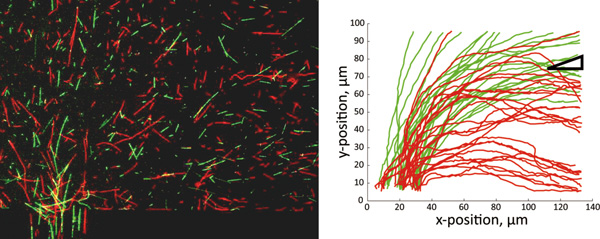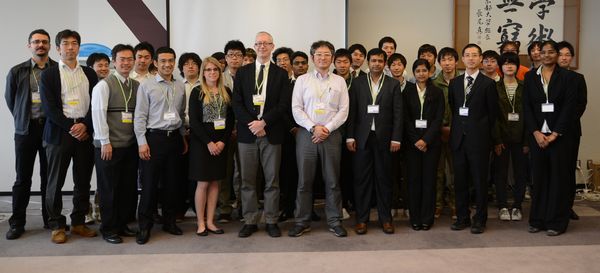Nanosystem Integration by Surface Charge Modification of Microtubules and Micro/Nano Fabrications
Project Gist
Molecular nano systems realized by electro-mechanical designing of motor proteins.
Keywords
Kinesin, Microtubule, Microfluidic device, Micro Electro Mechanical Systems (MEMS), Micro Total Analysis Systems (MicroTAS)
Background, Purpose, and Project Achievements
Many kinds of motor proteins are involved in intracellular transport in a live cell. Kinesin that moves on a cytoskeleton, microtubule, is known to have motility in vitro, and can be utilized as nanoactuator for molecular transport. In this research project, we designed the surface charge density of microtubules and microfluidic devices that enables microtubule gliding on a kinesin-coated glass surface. We realized two distinctive microtubule gliding directions, which will contribute to propose a new molecular nano system.
Future Prospects
In this research project, we designed the surface charge density of microtubules. As a next topic, we plan to modify the rigidity of microtubules that will also modulate a curvature of microtubule trajectories in an electric field.
Figures



Principal Investigator

・YOKOKAWA Ryuji
・Department of Micro Engineering, Graduate School of Engineering
・Ryuji Yokokawa is an Associate Professor at Department of Microengineering, Kyoto University, Japan. He received the Ph.D. degree from the Electrical Engineering Department at The University of Tokyo, Japan, in 2005. He was an Assistant Professor at Department of Micro System Technology, Ritsumeikan University (2005-2009), and Department of Micro Engineering, Kyoto University (2009-2011). He was a project researcher of Precursory Research for Embryonic Science and Technology, Japan Science and Technology Agency (PRESTO, JST) (2008-2014), and an adjacent faculty of World Premier International Research Center (WPI) Initiative, Integrated Cell-Material Sciences (iCeMS), Kyoto University (2010-2012). His current research areas are microfluidic devices with focus on biomolecules, and nanosystems by integration of Micro/Nano Electro Mechanical Systems (MEMS/NEMS) and motor proteins. He is a member of IEEE, MRS, IEEJ, JSME and Cheminas.
・http://www.ksys.me.kyoto-u.ac.jp/ry/e/
